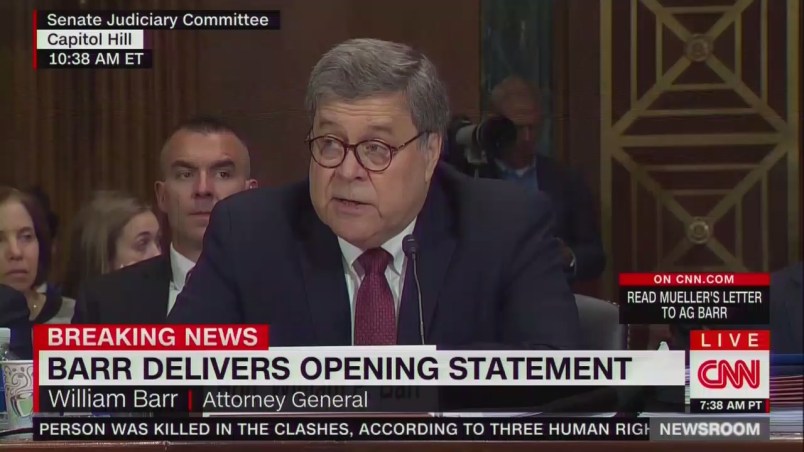Attorney General William Barr and his colleagues at the Justice Department first heard that special counsel Robert Mueller would not be making a determination on whether the President obstructed justice during a meeting on March 5, 2019, Barr said during his testimony before the Senate Judiciary Committee on Wednesday.
Barr said he was “frankly surprised” by Mueller’s decision and peppered him with questions about the reasoning behind it. He also defended his characterization in his March 24 letter that Mueller’s decision not to indict President Trump on obstruction did not take into account the Department of Justice’s Office of Legal Counsel (OLC) rule that it’s impermissible to indict a sitting president. Barr suggested that Mueller’s team merely could not reach a conclusion, when their thought process was more nuanced than that.
“Special counsel Mueller stated three times to us in that meeting in response to our questioning that he emphatically was not saying that but for the OLC opinion, he would have found obstruction,” Barr said Wednesday. “He said that in the future, the facts of the case against a president might be such that a special counsel would recommend abandoning the OLC opinion, but this is not such a case.”
Barr said he and his colleagues did not “quite understand” why Mueller wasn’t going to reach a decision, and when pressed at that March 5 meeting, Mueller’s team said they were still “formulating an explanation.”
“Once we heard that the special counsel was not reaching a conclusion on obstruction, the deputy and I discussed and agreed that the department had to reach a decision. We had the responsibility to assess the evidence as set forth in the report and to make the judgment,” Barr said Wednesday.
“I say this because special counsel was appointed to carry out the investigative and prosecutorial functions of the department and to do it as part of the Department of Justice,” he continued. “The powers he was using, including the power of using the grand jury and using compulsory process, exists for that purpose, the function of the Department of Justice in this arena, which is to determine whether or not there has been criminal conduct. It’s a binary decision.”
It was not previously known that Barr discussed the obstruction case with Mueller at a March 5 meeting, and that at that time, Barr decided he would reach a conclusion on whether the president obstructed justice.







The Attorney General is about to learn why it is a cliche that one should never piss off a Marine.
Semper Fidelis, Mr Mueller.
Paging Mr. Mueller! Would Mr. Mueller please pick up the white courtesy phone?
“He said that in the future, the facts of the case against a president might be such that a special counsel would recommend abandoning the OLC opinion, but this is not such a case.”
So the case is not serious enough to recommend abandoning the OLC opinion, but it can still be serious enough to indict Trump but for the OLC opinion.
With all due respect to Tena, but “have we impeached this motherfucker yet?”
When asked about McGahn testifying and referring to the assertion of Executive Privilege, Barr actually said, “We have not asserted privilege yet.”
WE?? WE??
It is clear he is not the "people’s lawyer.’
Adios MOFO.